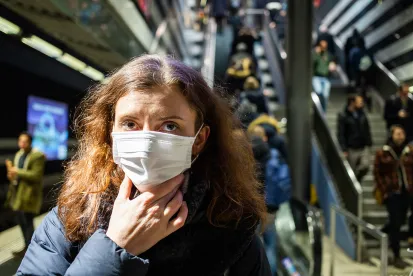A year after the COVID-19 pandemic hit the United States, it remains to be seen how the Biden Administration will approach enforcement against businesses who received pandemic relief through the CARES Act and other federal spending packages. Nonetheless, patterns of enforcement related to pandemic assistance in 2020 and early 2021 may provide insight into potential enforcement trends in the future. While these cases have largely focused on small businesses that submitted fraudulent applications for relief funds (i.e. low-hanging fruit), these cases may set the stage for Department of Justice (“DOJ”) enforcement against larger companies.
COVID-19 Enforcement To-Date
Enforcement cases in the past 12 months have focused on the most obvious cases of fraud. Last Friday, March 26, the DOJ announced that it had charged 474 defendants in 56 federal districts based on fraud schemes related to COVID-19, including attempts to obtain over $569 million in pandemic relief funds. The vast majority of enforcement cases concerned fraudulent applications and use of stimulus funds for small businesses, including the Paycheck Protection Program (“PPP”) and Economic Injury Disaster Loans (“EIDL”).
Many of these enforcement actions alleged that individuals submitted applications for nonexistent businesses, inflated their payroll expenses by overstating the number of employees, and submitted manipulated tax documentation with their applications. For example, on March 18, 2021, a New Jersey man was charged with fraudulently obtaining $1.9 million in PPP funds. He allegedly submitted 10 fraudulent PPP loan applications to several lenders on behalf of 10 different businesses. Each application is alleged to have included false information, such as falsified tax documentation and fabricated identities of numerous business partners.
The DOJ also has prosecuted conspiracies to recruit other business owners to submit fraudulent PPP applications on their behalf in exchange for kickbacks. In October 2020, the U.S. Attorney’s Office for the Southern District of Florida charged 12 individuals for conspiring to submit over $24 million in fraudulent PPP applications.
Further, the DOJ has pursued charges related to fraudulent medical treatments for COVID-19. Several charges have related to individuals peddling false cures, and vaccine scams. Recently, the DOJ brought its first criminal charges on false Medicare claims. At the end of December 2020, two owners of over a dozen pharmacies in New York City and Long Island were indicted for using COVID-19 emergency override codes to submit over $30 million in false claims to Medicare. Given that more money remains to be lent out and a variety of healthcare-related investigations remain ongoing, more criminal healthcare fraud charges seem certain to come.
What to Expect from Enforcement in 2021
For those reasons and others, while enforcement in 2020 largely focused on individuals engaged in relatively minor fraud, these same enforcement theories likely will be applied to more significant fraud in the near future. COVID-19 relief funds disbursed to corporations generally included strict certification requirements like those in the PPP, and the government will scrutinize whether recipient companies submitted false documentation to obtain relief funds. The government may investigate other-than-small companies that received PPP funds they did not qualify for, or companies that fraudulently obtained funds from other sources like the Main Street Lending Program or Provider Relief Fund. Enforcement in 2021 also may shift its attention to fraud related to COVID-19 treatment, such as through fraudulent billing.
Civil enforcement actions also seem certain to arise. On January 12, 2021, the DOJ announced its first civil settlement related to fraudulent PPP loans, which included claims under the False Claims Act (“FCA”) and the Financial Institutions Reform, Recovery and Enforcement Act (“FIRREA”). The settlement previews the government’s expected use of civil enforcement actions to recover losses in cases with less blatant criminal fraud, and the number of new civil enforcement actions likely will accelerate in the near future. The DOJ’s March 26, 2021 press release also warned that FCA “whistleblower complaints have been on the rise as unscrupulous actors take advantage of vulnerabilities created by the COVID-19 pandemic and the new government programs disbursing federal relief,” signaling that FCA enforcement actions related to pandemic relief fraud are all but certain in the near future.
Finally, we also can expect the DOJ, under Merrick Garland, to begin shifting its focus to larger companies that have received pandemic relief funds more generally. Changes in administration do not typically lead to significant changes to enforcement policies. However, given the size and political salience of the COVID-related federal stimulus programs, Garland may direct his staff to aggressively pursue fraud claims, focusing on ensuring that relief funds are spent on proper recipients. The Democrat-controlled Congress also is highly motivated to investigate the Trump Administration’s handling of COVID-19 relief, and has already launched investigations demanding information from companies that received government funds.
Companies that have received federal stimulus funds should review the representations they made to the government in order to receive such payments. The Small Business Administration has announced plans to automatically audit PPP loans of $2 million or more, and other agencies also are likely to investigate high-dollar aid recipients. If necessary, recipients of stimulus funds should consult with outside counsel with expertise in government enforcement for advice on preparing for and handling potential audits and enforcement actions. Outside counsel also will be able to perform internal investigations under the protection of attorney-client privilege to identify potential misrepresentations and liabilities related to federal stimulus funds. These precautionary measures will help put companies in the best position possible if the government focuses its attention on recipients who may have made mistaken misrepresentations but not engaged in outright fraud.
As you are aware, things are changing quickly, there is no clear-cut authority or bright line rules in this area, and the aid measures and interpretations described here may change. This Blog does not reflect an unequivocal statement of the law, but instead represents our best understanding and interpretation based on where things currently stand. This Blog does not address the potential impacts of the numerous other local, state, and federal orders that have been issued in response to the COVID-19 pandemic, including, without limitation, potential liability should an employee become ill, requirements regarding family leave, sick pay, and other issues.



 />i
/>i

